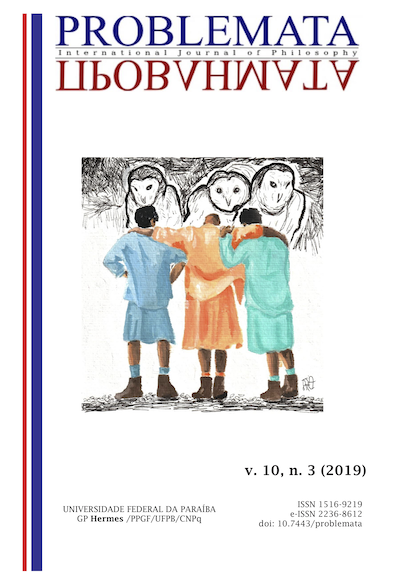DUSSEL OR HABERMAS:
AN ETHIC FOR LATIN AMERICA
DOI:
https://doi.org/10.7443/problemata.v10i3.49252Keywords:
Ethics, Third World, Dussel, Habermas, EmancipationAbstract
The goal of the present paper is to establish a parallel between the ethical perspectives presented by Dussel and Habermas and, from these assumptions, to argue if the universal consensus meets the citizenship demands of the Latin American man. On the one hand, Dussel starts from a responsible exegesis of Marxian writings which, purged in the light of third world demands, leads to the idea of praxis as the path to man's self-liberation. It is, in fact, a loosening of the Europeanist aspect of the critique of the nineteen hundred, in order to create, through social work, the disalienation. On the other hand, although Habermas shows some sensitivity to the problem of man excluded by capital relations, his universalism is attached to the old world. It is therefore necessary to ask whether this whole theoretical building is sufficient to meet the emancipation needs of the third world man. Such an analysis leads us, certainly, to the concept of utopia, so dear to Dussel, thematized as a space yet to happen, as a possibility for the realization of man. Aspect that for Habermas is linked to the future as a construction of democracy.
Downloads
References
_____. Filosofia da libertação: crítica à ideologia da exclusão. Tradução: Georges I. Maissait. São Paulo: Paulus, 1995. (Coleção Pesquisa & Projeto).
_____. Hacía um Marx desconocido: um comentário de los Manuscritos del 61-63. México: Siglo XXI, 1988.
HABERMAS, Jürgen. Ética do discurso. Lisboa: Edições 70/Almedina, 2014 (Obras escolhidas; 3).
_____. Mudança estrutural da esfera pública: investigações quanto a uma categoria da sociedade burguesa. Tradução: Flávio R. Kothe. Rio de Janeiro: Tempo Brasileiro, 1984. (Biblioteca Tempo Universitário; n. 76. Série Estudos Alemães).
_____. Teoría de la acción comunicativa: racionalidad de la acción y racionalización social. Tomo I. 4º ed. Tradução: Manuel Jiménez Redondo. Madrid: Taurus, 1987 (Coleção Ensayistas; 278).
_____. Teoría de la acción comunicativa: crítica de la razón funcionalista. Tomo II. Tradução: Manuel Jiménez Redondo. Madrid: Taurus, 1987. (Coleção Ensayistas; 279).
KANT, Immanuel. Resposta à pergunta: Que é "Esclarecimento"?, pp. 63-71. In: _____. Immanuel Kant: textos seletos. 9º ed. Tradução: Emmanuel Carneiro Leão. Petrópolis: Vozes, 2013.
MAGALHÃES, Fernando. 10 lições sobre Marx. Petrópolis: Vozes, 2009. (10 lições).
MARX, Karl; ENGELS, Friedrich. A ideologia alemã. Tradução: Conceição Jardim; Eduardo Lúcio Nogueira. Lisboa: Presença, 1974.
_____. As lutas de classes na França de 1848 e 1850. In: MARX, K.; ENGELS, F. Textos. v. 3. São Paulo: Alfa-Omega, 1977.
_____. Manifesto do partido comunista. Tradução: Pietro Nassetti. São Paulo: Martin Claret, 2003. (A obra prima de cada autor).
VIEIRA, Antonio Rufino. Marxismo e libertação: estudos sobre Ernst Bloch e Enrique Dussel. São Leopoldo: Nova Harmonia, 2010.
Downloads
Published
Issue
Section
License
Authors who publish with this journal agree to the following terms:
- Authors retain copyright and grant the journal right of first publication with the work simultaneously licensed under a Creative Commons Attribution License that allows others to share the work with an acknowledgement of the work's authorship and initial publication in this journal.
- Authors are able to enter into separate, additional contractual arrangements for the non-exclusive distribution of the journal's published version of the work (e.g., post it to an institutional repository or publish it in a book), with an acknowledgement of its initial publication in this journal.
-
- Authors are permitted and encouraged to post their work online (e.g., in institutional repositories or on their website) prior to and during the submission process, as it can lead to productive exchanges, as well as earlier and greater citation of published work (See The Effect of Open Access).





